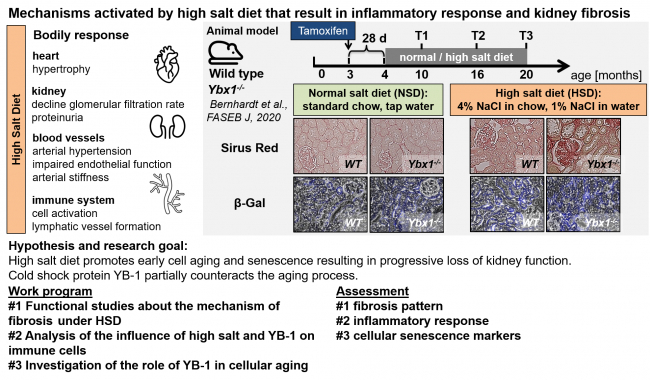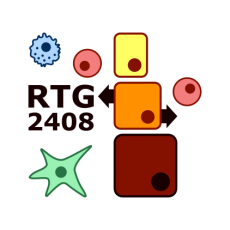Anna Krause

Anna Krause
MD Student
Medical Doctor Project 10
MD10: Excessive sodium chloride ingestion promotes immune cell infiltration and kidney fibrosis in aging mice
|
|
Excessive sodium chloride ingestion is continuously rising in the western world. High salt diet (HSD) damages the kidneys leading to fibrosis, tubulointerstitial injury and renal hypertrophy. Furthermore HSD aggravates albuminuria and decreases the glomerular filtration rate, which is associated to a worse CKD prognosis. A focus of our group are the roles that cold shock proteins play in inflammatory diseases, with the most prominent being Y-box binding protein-1 (YB-1). Members of this protein family regulate cell proliferation, matrix synthesis and the inflammatory milieu. Within this project we plan to further investigate the role of YB-1 in an HSD-induced damage model. To achieve this we use an tamoxifen-inducible Ybx1 knockout (KO) strain and compare wildtype (WT) and KO mice that receive either a normal salt diet (NSD; standard chow, tap water) or a high salt diet (HSD; 4%NaCl in chow, 1% NaCl in water) for up to 16 months. So far it remains unclear whether a direct link between high salt intake and kidney fibrosis exists autonomously from arterial hypertension. Therefore our mouse model is remarkable as we could show the absence of elevated blood pressure in our animals. Our previous findings demonstrated that HSD-induced proximal tubular phenotypic changes and sodium-glucose cotransporter-2 expression are coordinated by cold shock Y-box binding protein-1 (YB-1). Furthermore we could show that HSD leads to kidney fibrosis and that this fibrosis is aggravated in YB-1 KO animals. To further determine the damage pattern of HSD-induced fibrosis we plan to perform immunohistochemical staining of kidney tissue for different markers of fibrosis. In addition we found that immune cell infiltration is increased under HSD while this immune response is blunted in YB-1 KO animals. To further understand the effect of excessive sodium intake on the immune system fluorescent activated single cell sorting of different infiltrating cells, that are influenced by HSD, will be performed.
|
Photos: by UMMD, Melitta Schubert/Sarah Kossmann









